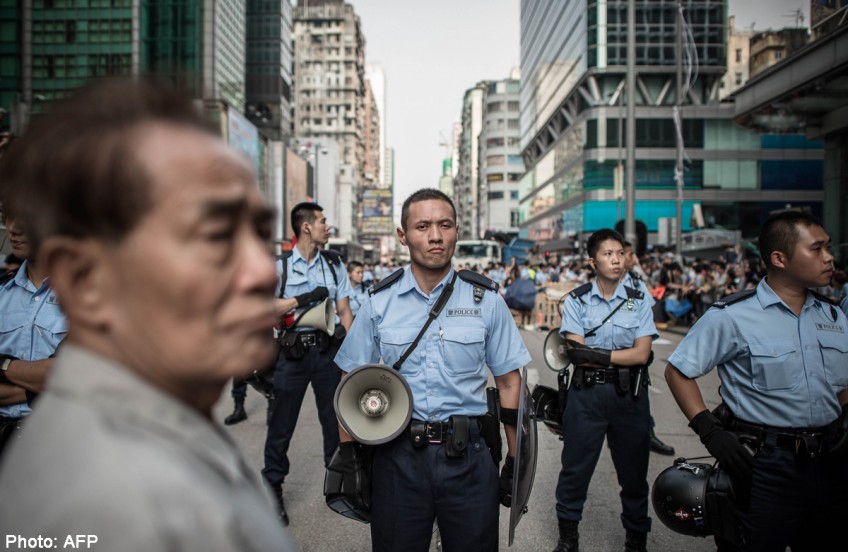Tycoons would do well to throw in their lot with the poor


Money and political power have long been entwined, especially in a city like Hong Kong. It is an arrangement that can be upended by one-man, one-vote.
With unfettered elections, the poor can attain disproportionate power and exert pressure on elected leaders to produce sub-optimal, populist policies. That, at least, seemed to be the sub-text of a comment made by Hong Kong Chief Executive Leung Chun Ying during a media interview on Monday.
On why Hong Kong should not have fully open elections, he said that a "broadly representative" nominating committee to vet candidates is necessary; otherwise, the city's poor will dominate the electoral process.
"You have to take care of all the sectors in Hong Kong as much as you can. And if it's entirely a numbers game and numeric representation, then obviously you would be talking to half of the people in Hong Kong who earn less than US$1,800 (S$2,300) a month," he said.
"Then you would end up with that kind of politics and policies."
Mr Leung's eyebrow-raising comment has given much fodder to critics who have long argued that Hong Kong's political system lacks accountability to the common people, and are instead geared towards protecting the city's wealthy and privileged.
This, they say, has helped give rise to deep-seated woes such as one of the widest wealth gaps in the world, high property prices and stagnant social mobility.
The thrust of Mr Leung's argument is not new. Two months ago, Tsinghua University's law dean Wang Zhenmin, who advises Beijing on Hong Kong matters, explained why the central government has to especially protect the interests of the tycoons.
"Universal suffrage means the redistribution of economic interests among society's members," he said. "We have to take care of every class, rich or poor, especially those whose slice of pie will be shared by others upon the implementation of universal suffrage." In particular, he said, the business community "controls the destiny" of Hong Kong's economy. "If we just ignore their interests, Hong Kong capitalism will stop."
Never mind the irony that a government which is communist, in name at least, is defending the privileges of Hong Kong's capitalist class of landlords. There are a few reasons why it is doing so, say analysts.
One, "red investments" belonging to Chinese princelings and state-owned enterprises in Hong Kong are at stake, says economist Francis Lui. "So if an elected government suddenly changes Hong Kong into a more socialist society with restrictive rules on, say, the free flow of capital, or a welfare state, many people in the central government wouldn't like that."
Two, beyond narrow interests is the "legitimate need" to ensure that an economy that has grown vibrant along laissez-faire principles, such as low taxes and a balanced budget, continues to thrive, argues businessman David Wong, a delegate to China's legislature, the National People's Congress.
This, he notes, is enshrined in Hong Kong's Basic Law. The nominating committee is thus "a check and balance on populist pressures". Fears are labour and welfare interests - Hong Kong has legislated a minimum wage and is now legislating standard working hours - will gain the upper hand.
Three, the problems that the poor in Hong Kong face - real as they are - cannot be so neatly pinned on the untrammelled power of big business. Other factors, including globalisation, a weak government and diverse lobbying interests, are involved too.
Their complexity is evidenced by the fact that Hong Kong's pro-democracy legislators, despite their constant sniping at the establishment, have not come up with any better proposals, points out economist Ho Lok Sang.
At the same time, Beijing's jitters seem unfounded. Will the "unwashed masses" really agitate for a race to the bottom? Such fears, says Professor Ho, are exaggerated. Safeguards are easily built in. For instance, "we can legislate so that any major policy initiatives need to be reviewed by a fiscal sustainability commission, and approved only if they are sustainable and well-founded".
The hope that a nominating committee will keep out "populist" candidates is also misguided, adds Professor Lui. Out of the initial gates, they will still have to appeal to the broad swathe of voters, to be the ultimate chosen one among the pre-selected two or three.
Ultimately, the tycoons who are far-sighted will do well to throw in their lot with the poor in supporting universal suffrage, Prof Lui adds. Many have long moaned about the dysfunctional governance in Hong Kong.
"With a popular mandate from a few million people, an elected leader can do better at running the city, which benefits the tycoons as well," says Prof Lui.

This article was first published on Oct 23, 2014.
Get a copy of The Straits Times or go to straitstimes.com for more stories.